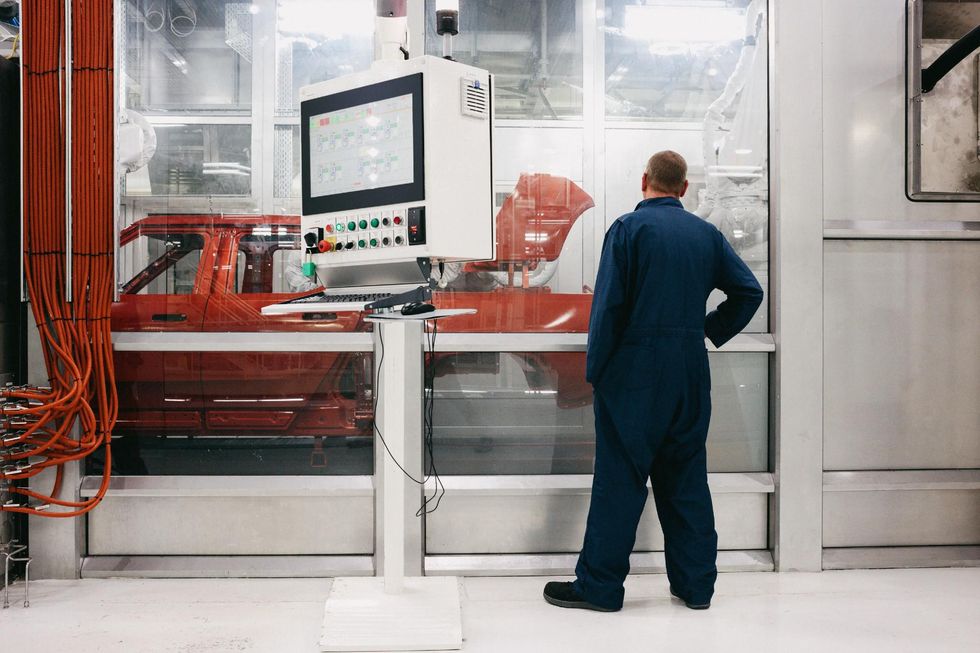Ex-Rivian VP Files Suit, Claiming She Was Slowly Shut Out From Company Decisions Ahead of IPO
Zac Estrada is a reporter covering transportation, technology and policy. A former reporter for The Verge and Jalopnik, his work has also appeared in Automobile Magazine, Autoweek, Pacific Standard, Boston.com and BLAC Detroit. A native of Southern California, he is a graduate of Northeastern University in Boston. You can find him on Twitter at @zacestrada.

Laura Schwab knew she would be taking a risk by joining Rivian, the Irvine-based electric vehicle startup.
The company was in a race with Ford, Tesla and General Motors to have the first mass-market, all-electric pickup truck to market. Schwab was tasked with effectively building Rivian's sales and marketing operations from scratch, less than a year before the first orders for their R1T electric pickup truck were supposed to be met — all for a lower salary than what she'd earned in stints at Aston Martin of the Americas and Jaguar Land Rover North America.
On Nov. 20, 2020, she decided to embrace the risk and joined the team.
But she never expected she'd be shut out of the planning process for the launch of the R1T – the company's signature product. Yet that's exactly what Schwab says happened in a lawsuit filed against Rivian in the Orange County Superior Court on Nov. 4.
In the scathing 14-page lawsuit Schwab alleges that she started in a lofty role at a luxury auto maker but quickly became ostracized for what she came to see as a misogynistic culture that marginalized women. Her allegations of gender discrimination echoes other discrimination lawsuits that have dogged some of the largest tech startups amid rapid expansion and public offerings.
Schwab claims she was effectively excluded from big-picture decision-making — despite her repeated warnings that delivery dates wouldn't be met and financials that weren't penciling out.
The first court hearing with Judge Stephanie George is set for April 13.
At first, Schwab said in the lawsuit she was involved in discussions with company leaders, including founder and CEO RJ Scaringe. Her first employee evaluation was also favorable, noting that she worked well with others at Rivian "perceived to be difficult or too challenging to work with," according to the lawsuit.
But eventually the conversations with Scaringe stopped and a boy's club of close friends and early employees excluded her from meetings Schwab felt she should be in to do her job.
"This emphasis on culture resonated deeply with me as I believe that the greatest brands and companies will survive and thrive not just by the products they make but the culture they create to find and keep great talent," Schwab wrote in a Medium post published the day she filed her suit.
Through her attorney, David Lowe of Rudy Exelrod Zieff and Lowe in San Francisco, Schwab declined a request to comment further on her allegations. Rivian also declined to comment, noting that it is in a quiet period ahead of its initial public offering this week.
Founded in 2009, Rivian bills itself as a company that "want[s] to make a difference," and one for which a "collaborative culture is critical... to deliver on our mission."
Schwab's lawsuit suggests the fledgling automaker has failed to live up to that goal.
After determining the price of the R1T and related R1S SUV was too low and the company would lose money as it scaled up, Schwab told Rivian's finance director of the problem and worked to determine how much of a loss the company would take, according to the complaint. She claims she was ignored when she raised the red flag to her supervisor, Chief Commercial/Growth Officer Jiten Behl. But when a male colleague alerted Behl, he agreed the vehicle price would eventually go up.
The claim also states that Schwab at one point asked CFO Claire McDonough to attend a meeting about Rivian's sales projections and ensure the targets were reasonable. Schwab said McDonough was excluded from those meetings, too.
Schwab's suit states she told Behl the first vehicles off the production line shouldn't go to customers, but to Rivian employees who could identify any manufacturing issues that could be resolved before they reached the public. Initially brushed off, the company later adopted that plan.
She also warned that Rivian would miss its launch date target, after already being pushed from early 2020 to early 2021. In July, the company said it would deliver a few R1T trucks in September, with general deliveries starting in January, to comply with the S-1 filing stating 1,000 vehicles would reach customers in 2021.
And as Schwab gradually lost more contact with other Rivian leaders and had her tasks reassigned to men and other departments, she learned of other top female employees who weren't invited to meetings they felt they should be part of.
In mid-October, Schwab informed HR about her recent experiences. She was terminated days later by Behl after weeks of emails and communications that the complaint alleged were "perplexing," "hostile" and "inappropriate."
As part of her compensation package upon being hired in 2020, Schwab received a generous stock option plan from Rivian.
The Rivian lawsuit is just one of many instances recently in which women and employees of color at tech firms have pushed back against what they say are discriminatory and hostile workplaces.
Five women filed lawsuits against Amazon—which just this month inked a deal with Rivian—in May alleging discrimination and harassment from white managers at different offices. In August, Tesla was ordered to pay $1 million in a racial discrimination suit by a worker at its Fremont assembly plant who was subjected to slurs and epithets. Then in October, it lost another suit from a Black elevator operator after ignoring complaints of discriminatory behavior. The automaker was ordered to pay $137 million in that case.
"That is why Rivian's retaliation against me is so heartbreaking," Schwab wrote in her Medium post. "In addition to harming my family and me, it has the potential to deter other women from pursuing opportunities or from speaking out about discrimination."
- Rivian IPO Expects $55 Billion Valuation - dot.LA ›
- Former Rivian VP Sues EV Company Ahead of Its IPO - dot.LA ›
- Rivian IPO Filings Show Losses Before Going Public - dot.LA ›
- Rivian Stock Prices Soars Above 25% on Nasdaq Debut - dot.LA ›
- Ford and Rivian Nix Plans to Make Electric Vehicle Together - dot.LA ›
- Could Rivian Layoffs Actually Signal Progress? - dot.LA ›
- Will Rivian's Q4 Earnings Make or Break the Company? - dot.LA ›
Zac Estrada is a reporter covering transportation, technology and policy. A former reporter for The Verge and Jalopnik, his work has also appeared in Automobile Magazine, Autoweek, Pacific Standard, Boston.com and BLAC Detroit. A native of Southern California, he is a graduate of Northeastern University in Boston. You can find him on Twitter at @zacestrada.






 Image Source: Skyryse
Image Source: Skyryse